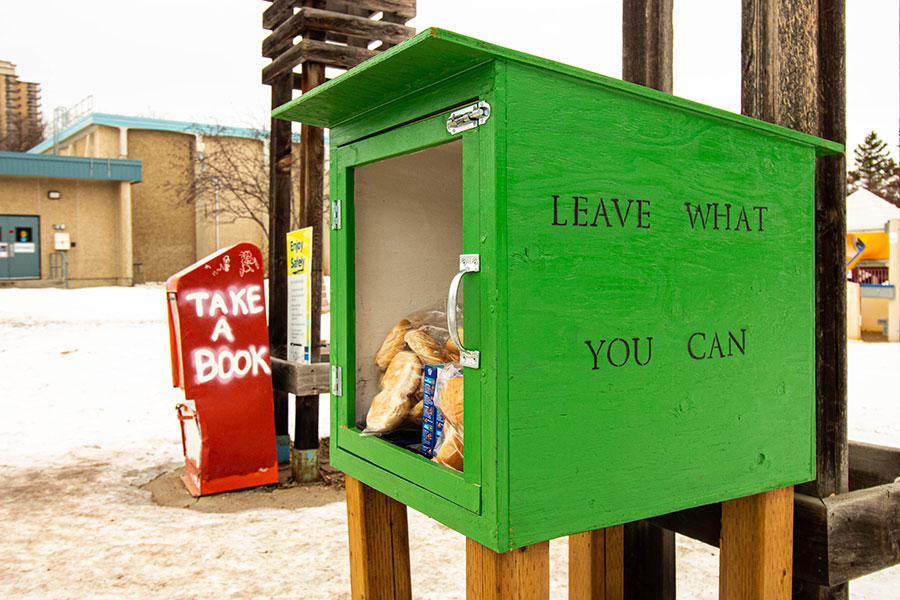A simple box provides basic necessities to those who need them
Earlier this year, a mysterious box appeared in Oliver Park. Located near the outdoor pool and the ice rink in central Edmonton, the green wooden cabinet was stocked full of canned goods, Kraft Dinner and Gatorade, as well as toiletries like socks, Kleenex, and toilet paper – all free for the taking.
This community pantry, the first of its kind in the city, turned heads around the neighbourhood with its innovative approach to distributing key supplies to those in need. It was later featured on CBC Radio. But beyond some encouraging words from the Oliver Community League, which approved its installation, details about the origins of the pantry were hard to come by.
As it turns out, that was by design.
The pantry is the brainchild of Paul Harford, a fourth-year NAIT student who came up with the idea as part of his studies for his Bachelor of Technology program. He lives near the neighbourhood and remembers walking through it one day and noticing an abundance of Little Free Libraries, which are small, customized containers for redistributing books. More than 100,000 of these libraries have been built to date, in upwards of 100 countries around the world.
“They seemed to get a lot of use,” Harford says of the little libraries in Oliver. “Every week, it seemed like quite a lot of volume went through them. It was cool how the community adopted them as their own.”
So he got to thinking: if it worked for books, why not for food?
Anonymity the key to success

At the time, Harford was taking a class that explored ideas of sustainability in society. In addition to the usual readings and discussions, students were tasked with creating an applied project, which would put the ideas they’d learned into practice.
Harford was drawn to the concept of community sustainability, as many of his course readings suggested that this was the most effective level for effecting change. Appealing to individuals was considered too isolated, while the momentum required for change at a national or international level was daunting. The community level was just right.
Harford reached out to the Oliver Community League, which saw the appeal of a free pantry right away.
“We thought Oliver Park would be a great place to put it, as there’s lots of foot traffic and lots of families that come and go,” Luwam Kiflemariam, the league’s vice-president, told Edmonton AM in August 2020.
Then, over the course of a couple of weekends, Harford and a friend built the box, which stands atop four wooden posts, and they quietly installed it in the park earlier this summer.
The project relied on word of mouth to get going, so it took a few weeks for residents to realize the pantry was there and available to them. But as soon as the community caught on, they responded in a big way. Initially Harford was restocking the pantry himself, but before long he realized it was being anonymously refilled just the same way it was being emptied.
That discretion is a big reason why Harford believes the pantry has become so popular.
“It’s completely anonymous, which makes it accessible,” he says. With other food-support programs, Harford says, you have to share personal information and show up in person. “Whereas with this, it’s right there [in your neighbourhood]. I’m definitely happy to see people using it.”
“Paul’s project was so inspiring because he really took it to heart,” says Alexandra Pulwicki, the NAIT instructor who oversaw the project. She was impressed with how much of himself he put into it. “It was inspiring to see a student go above and beyond.”
“It was inspiring to see a student go above and beyond.”
In fact, the project has proven so successful that Harford’s friend, who helped build the pantry, is installing a second one in his own neighbourhood at the Orchards at Ellerslie, in the south end of the city.
Harford never sought out attention or credit for his idea, but he hopes the number of pantries can continue to grow, as more communities recognize the value they provide by covering needs that aren’t always obvious on the surface.
“It’s great to see that when people put themselves out there, into their community, there’s this really positive response,” adds Pulwicki. “Hopefully this encourages others to put themselves out there, too. If you have an idea, try it out. You never know what might happen.”